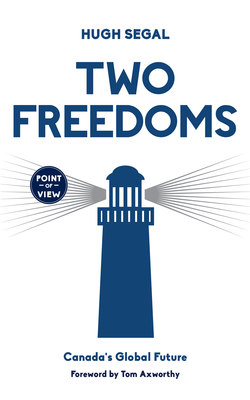Читать книгу Two Freedoms - Hugh Segal - Страница 8
На сайте Литреса книга снята с продажи.
Introduction
ОглавлениеThe idea for this book really belongs to Patrick Boyer, a senior editor at Dundurn Press, who came to me with a suggestion of a foreign policy book — one that would express a concise view of how Canadian foreign policy might change for the better. Patrick, who is a former MP, a distinguished author of books on law, ethics, the Senate, and constitutional issues, is someone whom I have known for years. The fact that we have disagreed as often as we have agreed with one another in no way diminishes my respect for him as an engaging and public service-oriented intellectual.
His case to me about writing a book was well developed. I have chaired both the Senate Committee on Foreign Affairs and International Trade and its Committee on Anti-Terrorism. I have served on the Standing Committee of National Defence and Security. I have visited Bosnia, the Middle East, and Afghanistan in various capacities. I have chaired the Canadian Institute of Strategic Studies, served as a senior fellow at the Global Affairs Institute in Calgary, and as the founding vice-chair of the Canadian International Council. Patrick also argued that my work as Canada’s special envoy to the Commonwealth and as the Canadian representative on the nine-member Commonwealth Eminent Persons Group focused on reform, human rights, and rule of law, both of which positions took me to countries in Asia, Africa, Europe, the Caribbean, and Australia, qualified me in a reasonably unique way.
“Surely,” he argued, “you are the right person to lay out how a more focused and balanced foreign policy would better serve Canada and the world.”
While I had referred to foreign policy issues in most of my writings, especially as they related historically to Canadian Tory policy strengths and weaknesses, an entire effort on foreign policy would be a new departure.
My decision to acquiesce to the suggestion really emerged from two compelling biases I have had about Canadian foreign policy for some time: sadly, our foreign policy has been more about “muddling through” with as little clarity as possible, avoiding controversy and restraining excess financial commitment for Canada rather than pursuing a precise purpose; and Canada’s best moments historically, in war and peace, have been underlined when our purpose and direction were precise, clear, and well-understood.
My respect for the professional diplomats in our Department of Foreign Affairs and my strong belief in the competence of our military have not, however, diluted my anxiety when they have been massively under-resourced for the tasks at hand or working in something other than a coordinated and coherent fashion.
My stand-up conclusion about this modest work is that it has to deal directly with both purpose and implementation as, if one of these were omitted, the book would not then actually address the full nature of the challenges and opportunities foreign policy represents for a dynamic and progressive democracy.
As I travelled over the years on one assignment or another in Bosnia, Poland, Russia, the Middle East, Turkey, Japan, Sri Lanka, Singapore, India, Bangladesh, Malaysia, Cuba, the Caribbean, Kenya, Tanzania, South Africa, and throughout Europe, I came to two compelling, deeply persuasive conclusions. Want and fear are acutely destructive and damaging elements in every society. Their prevalence and dominance usually mean genuine trouble and dislocation for families, communities, and countries, and in extremes, can lead to violence and war.
Freedom from want and freedom from fear struck me as the foundational freedoms upon which all other aspects of freedom, prosperity, and stability could be built. It was through this prism, this lens that I began to write this book.
